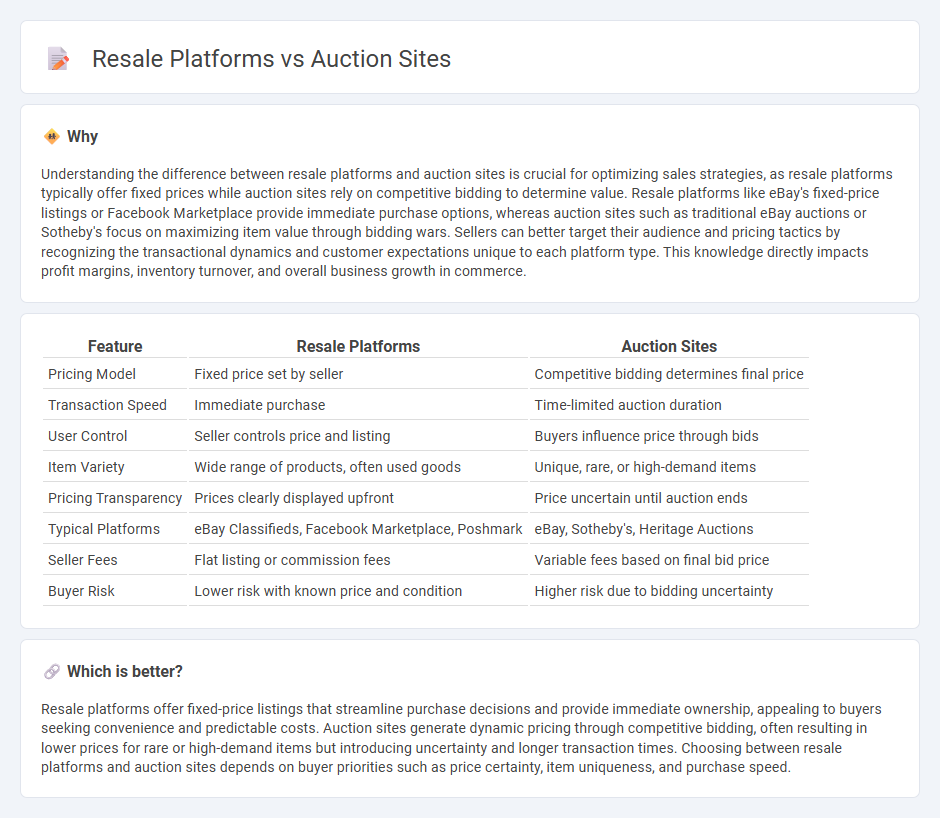
Resale platforms offer fixed-price listings where sellers can set a specific amount for their products, ensuring a straightforward and transparent buying experience. Auction sites create competitive bidding environments that often result in variable final prices and dynamic buyer engagement based on demand and rarity. Explore the key differences between these commerce channels to determine the best fit for your buying or selling goals.
Why it is important
Understanding the difference between resale platforms and auction sites is crucial for optimizing sales strategies, as resale platforms typically offer fixed prices while auction sites rely on competitive bidding to determine value. Resale platforms like eBay's fixed-price listings or Facebook Marketplace provide immediate purchase options, whereas auction sites such as traditional eBay auctions or Sotheby's focus on maximizing item value through bidding wars. Sellers can better target their audience and pricing tactics by recognizing the transactional dynamics and customer expectations unique to each platform type. This knowledge directly impacts profit margins, inventory turnover, and overall business growth in commerce.
Comparison Table
| Feature | Resale Platforms | Auction Sites |
|---|---|---|
| Pricing Model | Fixed price set by seller | Competitive bidding determines final price |
| Transaction Speed | Immediate purchase | Time-limited auction duration |
| User Control | Seller controls price and listing | Buyers influence price through bids |
| Item Variety | Wide range of products, often used goods | Unique, rare, or high-demand items |
| Pricing Transparency | Prices clearly displayed upfront | Price uncertain until auction ends |
| Typical Platforms | eBay Classifieds, Facebook Marketplace, Poshmark | eBay, Sotheby's, Heritage Auctions |
| Seller Fees | Flat listing or commission fees | Variable fees based on final bid price |
| Buyer Risk | Lower risk with known price and condition | Higher risk due to bidding uncertainty |
Which is better?
Resale platforms offer fixed-price listings that streamline purchase decisions and provide immediate ownership, appealing to buyers seeking convenience and predictable costs. Auction sites generate dynamic pricing through competitive bidding, often resulting in lower prices for rare or high-demand items but introducing uncertainty and longer transaction times. Choosing between resale platforms and auction sites depends on buyer priorities such as price certainty, item uniqueness, and purchase speed.
Connection
Resale platforms and auction sites both facilitate the secondary market by enabling users to buy and sell pre-owned goods, leveraging digital tools for price discovery and inventory management. These platforms often integrate similar features such as bidding systems, user ratings, and secure payment gateways, enhancing trust and transparency in transactions. By connecting sellers with a broader audience, resale platforms and auction sites drive value circulation and reduce waste in commerce ecosystems.
Key Terms
Bidding
Auction sites such as eBay enable users to bid competitively in real-time, driving prices up based on demand and scarcity, while resale platforms like Poshmark or Mercari often feature fixed-price listings with occasional negotiation. Bidding on auction sites provides dynamic price discovery and can lead to significant savings or competition for rare items, whereas resale platforms offer more predictable pricing with direct seller-buyer interactions. Explore the nuanced differences in bidding strategies and pricing mechanisms to maximize your buying or selling experience.
Peer-to-Peer
Peer-to-peer auction sites enable direct bidding between users, fostering competitive pricing through real-time offers on items ranging from collectibles to electronics. In contrast, peer-to-peer resale platforms emphasize fixed-price listings, allowing sellers to set their own rates with buyers negotiating or purchasing instantly, enhancing convenience and predictability. Explore our detailed comparison to understand which peer-to-peer marketplace best suits your selling and buying needs.
Fixed Price
Auction sites primarily rely on bidding dynamics to determine prices, often leading to variable final costs, whereas resale platforms emphasize fixed price listings that offer immediate purchases at set prices, ensuring cost certainty. Fixed price models on resale platforms streamline transactions and attract buyers seeking straightforward, no-haggle deals. Explore the benefits of fixed price options on resale platforms to optimize your buying and selling experience.
Source and External Links
Copart: Online Car Auctions | Repairable & Used Cars - A global leader in 100% online car auctions featuring used, wholesale, and repairable vehicles including cars, motorcycles, boats, and heavy equipment for buyers and dealers.
Live and Online Auctions on HiBid.com - A leading online auction platform offering auctions for antiques, collectibles, coins, estate items, cars, jewelry, and more in live and online formats.
LiveAuctioneers: Online Auctions for Arts, Antiques & Collectibles - Online auctions specializing in one-of-a-kind art, antiques, luxury goods, and collectibles with thousands of active listings across numerous categories.
 dowidth.com
dowidth.com